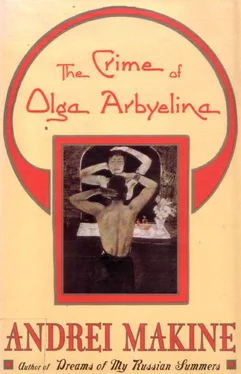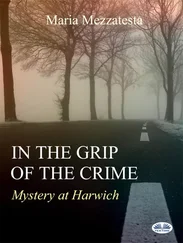"The reds called this form of execution 'the hydra of counterrevolution.' They roped ten officers together in a closely packed group. Shoulder to shoulder, back to back. And they pushed them off the deck of a barge or from the top of a jetty. Some would struggle, others went rigid, trying to play dead even before dying. Still others wept, weakened by their wounds… This one here managed to break free underwater, his feet already trapped in the mud. He forced the wire off his wrists and reached the surface hidden behind a block of granite from the jetty. It was only later that the faces of the others began to haunt him. Especially the eyes of the man whose body he pushed down brutally in order to escape from the water."
The old man looks at them as if he were awaiting a question, a response. And his look is no longer that of a strange genius of the place, "a kind of half-crazed priest and at least a hundred years old," but of a fellow human being. His words cut through several periods of history they have never known. So very human is his attitude that their prepared questions stick in their throats. All at once they notice dusk has fallen; only a narrow strip of the setting sun now casts its cloudy red light over this place bristling with crosses. They suddenly feel themselves to be face to face with some dizzying intuition, an insight that cuts into their lives with a blinding thrust… The visitor in the dark blue overcoat notices that the woman has begun to walk down the avenue at a pace that is carefully restrained, so as not to seem hurried. Conversely, she sees him moving away discreetly, escaping by skirting the tombs. They arrive at the exit at the same moment, but avoid looking at each other, as people do who have witnessed an assault taking place but did not intervene… Outside the wall there is still a little light, pink and watery. The man turns, sees the woman looking for her car key, her hand thrust into a little leather rucksack. For a moment he feels as if he were going back into the silent life that brought the two of them together beneath the trees in the cemetery. The woman's face seems intensely familiar to him. He is convinced he knows the timbre of her voice, without ever having heard it; that he has a deep understanding of the atmosphere of every one of her days and of today's unhappiness. As she opens the car door she looks up for a second. The man, some yards from her, smiles, takes a step in her direction. "It's the first time you've come here?" He smiles, draws closer. "It's the first time…" Smiles, takes another step toward her…
No, their cars have already driven off a moment ago, edging their way rapidly into the hissing stream of the freeway. It is only as he drives along, musing, that the man goes over in his mind the scene that never took place. He walks up to her, smiles: "You know, this is the first time I've come here and…" Lost amid the hurtling thrusts of the headlights, on routes that diverge farther and farther, each of them recalls the account that brought them to such a remote spot, on this freezing day: "You'll see, it's a real garden, well, more like virgin forest, there are so many trees, plants, and flowers. And each cross has a kind of tiny window with a night-light in it." They are telling themselves they should have come in summer or autumn to see the garden; now is too late. Should I go back there one day? the man ponders. Next Sunday? Take another look at those deserted avenues, those dark branches against the evening sky, that woman who… He shakes himself. Too late. The city swallows him into its dark, shifting complexity, streaked with red and yellow. Before racking his brains for a pretext to justify his escapade in the eyes of his loved ones, he thinks about the woman who, at this very moment, is herself somewhere being sucked down into the mighty flood of streets and lights. "To see her again would be as impossible as resurrecting the dead invoked by that old madman," he tells himself, summoning a grain of melancholy cynicism so as to regain a firm foothold in reality…
The old man accompanies them with his stare as far as the gate, then looks down at the name shown on the tombstone where the engraved letters stand out in the almost horizontal rays of sunlight. In the distance the sound of an engine dwindles and fades, like the trickle of sand in an hourglass.
Apart from the keeper only a tall figure remains; he seems to be vainly searching for a way out of the maze of intersecting paths and avenues. He is the very last of the visitors, quite a young man who has been coming here daily for the past three or four days. Despite the cold he is wearing a simple corduroy jacket which, with its narrow, elongated cut, recalls the dress of students in the old days. A white muffler, coarsely knitted, forms a kind of frilly ruff on his chest. He has the pale face of someone who, though chilled to the marrow, no longer feels any pain, his body having become as cold as the icy air.
He was the one just now, as he watched the visitors, who imagined their feelings, pictured their lives. First, the gawking group, then the two solitary ones who were on the brink of talking to one another and now will never meet again. He spends his own life guessing at other people's lives… A moment ago he noticed that this birch tree with two trunks had been split by yesterday's storm just at the point of the fork and that there was a risk that at any minute now the wind might enlarge the deep gash and bring down the twin trunk in a rending crash of timber. He tells himself that all the silence of the day hangs upon that mute cry. Taking a notebook out of a big satchel like a postman's, he writes in it: "The silence whose depths are plumbed by this suspended crash."
The man in the student's jacket is one of those invisible Russian exiles, increasingly isolated and shy with advancing years, who pursue a fantasy of writing and end their days in attics piled high with books, almost buried beneath the pyramids of pages that no one will have the courage to decipher. He has known several like this but tells himself that such a fate only befalls other people. In his own pyramids there will be the story of the reckless count who sold his childhood home, and that of the dancer who, as he died, called out the name of his lover, his murderer…
The old keeper lights the little night-light in the cross surmounting the grave where his evening round always concludes. It is the grave of the condemned man who wrenched himself free of "the hydra of counterrevolution." The man in the corduroy jacket heard this story yesterday, alone face to face with the old man. One detail intrigued him: the name marked on the tombstone is that of a woman. He has not dared to ask for an explanation… Now he sees a match flame shielded in the hollow of the keeper's hands, lighting them up from inside, then flaring on the wick of the night-light at the heart of the cross. The tiny glazed door closes, the sinuous flame flickers, steadies itself. The light and the sheltered warmth remind the young man so much of a long remembered room that he shivers. He is only a few steps away from the old man.
"Could you tell me about this woman?"
The old man's gaze seems to travel across long stretches of darkness, nocturnal towns long since peopled by ghosts. He is clearly trying to size up who he is dealing with: one of the inquisitive ones who come to collect two or three anecdotes? A fugitive who has escaped a family lunch and taken refuge here to gain a breathing space? Or perhaps the one whose coming he had given up hoping for?
He begins talking as he makes his way slowly toward the entrance gate that should have been locked at least an hour ago. His words are permeated by great weariness.
"Everyone would have it they were lovers. And that the death of that dubious character was murder."
It is the usual style of his stories: blunt, clear-cut, flat. All the man in the student's jacket expects is just one more anecdote. He is longing to get away, to drink a glass of warm wine, to go to bed… Suddenly the old man, as if he had sensed this desire to escape, cries out in urgent tones that can be heard almost as a plea and an apology for not knowing how to tell stories in any other way, "You're the first person I have ever told about her!"
Читать дальше












